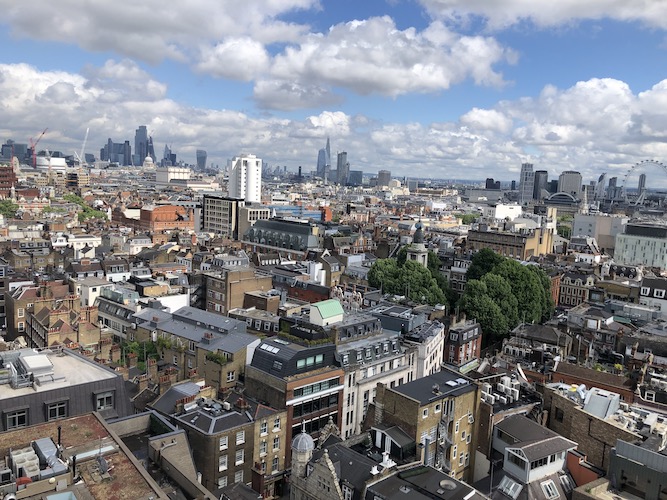The other day it was confirmed that a gigantic new railway for better connecting a struggling nation’s biggest cities will peter out at the edge of its biggest one. This national government decision followed three years (and counting) of that biggest city’s transport authority enduring a stop-go funding, micro-management ordeal that has inhibited recovery from the damage done by Brexit and Covid.
That same national government simultaneously refuses to help that biggest city’s government bodies and key parts of its economy in ways they’ve been crying out for, instead jealously asserting its own centralised powers while making a display of favouring other parts of the struggling nation and calling it fairness. That is despite the biggest city producing almost one quarter of the nation’s economic output and generating taxes spent in almost every other part of the struggling nation.
Congratulations. You will have already guessed that the nation in question is our fraying, foundering United Kingdom and that the biggest city referred to is London. The railway is, of course, HS2, which will stop a meagre five miles short of Euston for an unspecified age in what the government itself knows will be a false economy. The transport authority concerned is Transport for London, whose finances, wrecked by the effects of the pandemic, are still in a tricky state, not helped by oddballs, twisters and egotists upstream who thought they knew better than TfL’s bosses what is best for London’s transport networks and wished to score points against London’s Labour Mayor.
Centre for London’s spring conference heard last week from Labour and Conservative borough leaders alike that they crave greater powers to help them to help themselves and their residents. The same call was made by the chair of one of central London’s business improvement districts (also an adviser to several others). These pleas echoed previous ones for greater fiscal devolution to the capital made by not only Mayor Khan but also his predecessor, the con artist later known as Boris of the North. While the UK’s governing Tories have blazed an erratic trail of mayhem and mishaps in recent years, their deafness to such requests has been consistent.
But the modern-day duffing-up of London – there have been plenty of earlier eras – be it real, rhetorical or both, precedes the 2019 general election and its ensuing “levelling up” flummery. The capital has been recruited as a flexible attack metaphor for “why, oh why” populists of left and right alike since at least the announcement of the EU referendum.
For the former, London is the dark heart of “neoliberalism” and “gentrification” or the pampered beneficiary of that crude grievance concept “the north-south divide”. The latter’s version of London is simultaneously a “third world hellhole” and the dwelling place of an all-controlling “metropolitan elite” at odds with the people’s will as defined by some pillock on GB News. It’s often hard to decide which groupthink entity finds its characterisation of London the more potent for fomenting misdirected resentments – the “progressive” Guardian or Brexit Conservatives.
Any chance of some proper policies for helping the country off its knees as it watches the backside of even Putin’s Russia pull further ahead? Any prospect of firing up the “engine room” of the UK economy (B. Johnson, July 2010), not least so that more investment cash becomes available to help Manchester, Leeds and Birmingham fire up their own?
It is a painful irony that even as she laid further waste to the place Liz Truss recognised in public what her leadership opponent and successor Rishi Sunak surely knows, which is that London’s economy is fundamental to the wellbeing of the UK’s. She even put words into action by restoring VAT-free shopping for overseas visitors, something London business bodies had been asking for ever since Prime Minister Johnson brought it to an end.
Under Sunak, that decision was reversed, although there is, perhaps, some low key acknowledgement on his watch that the “levelling up” gesture politics of Johnson’s time at Number 10 have had some real and damaging consequences. I am drawn to opera like a vegan craves a steak, but the idea that you can lift an entire institution like English National Opera out of the Covent Garden setting from which it draws strength – and repays the compliment – and just plonk it down somewhere else suggests the wisdom of a think tank run by plankton. The rowing back from Nadine Dorries’s world-beating daftness is welcome, though it might not be far enough.
In two weeks’ time, the coronation of King Charles III will take place. Royal pageantry is just a single tile in the infinite mosaic that makes London so dynamic, but it is one that draws a crowd from across the country and around the world. Any national government with the national interest as its chief priority – as distinct from its electoral interests – would identify this large event as the moment for a bold relaunch of London as productivity powerhouse and global magnet, enabling TfL to reduce and reformulate fares, making it easier for businesses to recruit the staff they need, and for hospitality and cultural sectors to rev up for the summer months to come.
Instead, the see the Levelling up and Regeneration Bill plodding through parliament with next to nothing (or worse) for the capital. The huge importance of London has became – like Brexit, which London’s voters firmly rejected – one of the great unmentionables of national political debate, with neither the trailing Tories nor Keir Starmer’s cautious Labour seeing anything to gain from speaking up for it. And yet the fact remains that, as even London campaign bodies are wary of saying these days, London is the goose the lays the country’s golden eggs. Starve the goose and you know what happens next.
from onlondon.com
Dave Hill: Attacked from all sides, London should be strengthened not starved

